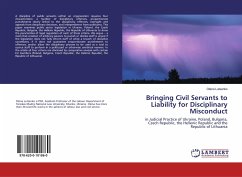A discipline of public servants within an organization requires four characteristics: a number of disciplinary offences, proportionate punishments clearly linked to the disciplinary offences, oversight and appeals from disciplinary decisions, and independence from politicians. This paper examines public sector legislation in Ukraine, Poland, the Czech Republic, Bulgaria, the Hellenic Republic, the Republic of Lithuania to show the peculiarities of legal regulation of each of these criteria. We argue - a claim that creation of arbitrary powers to punish or dismiss staff is unjust if the legislation does not fully inform staff of what a breach of discipline constitutes, if it does not guarantee proportionate punishments to offences, and/or allow the disciplinary process to be used as a tool to coerce staff to perform in a politicized or otherwise unethical manner. In the article all four criteria are disclosed by comparative analysis with certain EU members (Poland, Bulgaria, CzechRepublic, the Hellenic Republic, the Republic of Lithuania).








